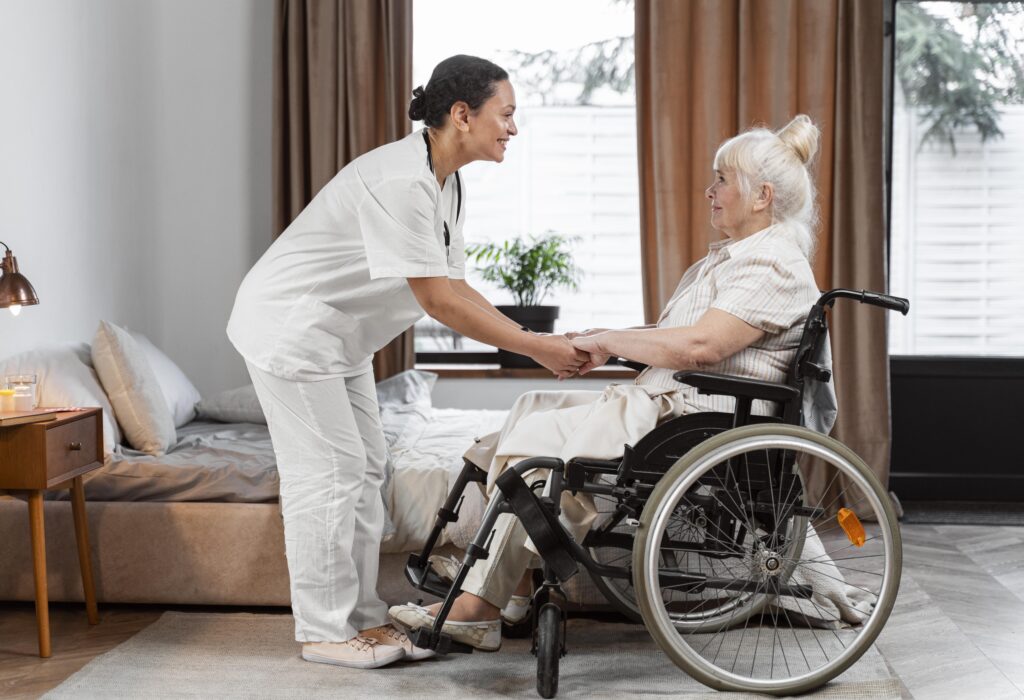Managing the balance between personal life and caregiving with help from a home care provider
Managing the balance between personal life and caregiving with help from a home care provider
Blog Article
The Value of Special Needs Solutions and the Impact of Home Care Providers
Special needs services are crucial for enhancing the lives of individuals with specials needs. They provide crucial assistance that promotes self-reliance and health. Home care companies play an essential role in this framework by supplying customized support tailored to unique needs. This assistance not just benefits individuals but also reduces the pressure on family caretakers. Understanding these dynamics reveals a much deeper connection in between care, autonomy, and community. What exists in advance for these critical services and their influence?
Recognizing Special Needs Services
While numerous may not fully grasp the intricacies of handicap solutions, they play a vital duty in improving the lifestyle for people with handicaps. These services encompass a wide array of assistance systems made to assist people in steering daily challenges. From offering access to education and learning and employment possibility to facilitating health care and rehab, impairment services aim to promote self-reliance and inclusion.Key elements include case monitoring, advocacy, and assistive technology, which aid people accomplish individual goals. Additionally, community-based programs frequently cultivate social connections, reducing sensations of isolation. Different companies and federal government entities team up to assure that people get customized support according to their special demands. Understanding these solutions is crucial, as they empower individuals with specials needs to lead satisfying lives, proactively take part in their areas, and understand their potential. Eventually, effective handicap solutions are foundational to advertising equity and access for all.

The Role of Home Treatment Providers
Home treatment service providers play an important role in delivering individualized support to people with handicaps, enabling them to maintain freedom in their very own homes - ndis providers. These specialists supply a vast array of services customized to fulfill the unique needs of each individual, ensuring that assistance is both reliable and relevant. They assist with daily tasks such as dish prep work, personal health, and medication monitoring, which are crucial for enhancing the quality of life for those they serve.Moreover, home treatment providers function as an essential link in between people and their healthcare requires, promoting communication with doctor and collaborating required services. Their visibility also eases the worry on family caregivers, promoting a much healthier dynamic within families. By cultivating a helpful and risk-free atmosphere, home treatment carriers empower individuals with disabilities to involve with their areas, seek individual passions, and inevitably lead fulfilling lives while continuing to be in the convenience of their homes
Personalized Care and Assistance
Personalized care and assistance are important parts of efficient home treatment solutions, as they deal with the specific demands and choices of each individual with an impairment. Home care providers evaluate the special requirements of each client, creating customized strategies that prioritize their convenience, health, and health. This personalized technique not just enhances the quality of care but additionally cultivates a feeling of self-respect and respect.Caregivers are trained to adapt their approaches, making sure that services line up with the client's way of life, social background, and personal preferences. Regular communication in between caretakers and clients aids to fine-tune treatment strategies, attending to any type of changing needs promptly. In addition, the focus on individualized support motivates the growth of trust and rapport, which can significantly enhance the total caregiving experience. Eventually, individualized care and assistance empower individuals with specials needs to obtain the aid they require in a manner that really feels respectful and affirming.
Enhancing Self-reliance for People
Enhancing freedom for individuals with impairments is a basic goal within home care services. These services offer tailored support that empowers customers to participate in day-to-day tasks autonomously (disability support). By giving support with personal care, wheelchair, and house tasks, home care providers allow individuals to preserve a feeling of control over their lives. This freedom cultivates self-worth and durability, vital elements in the trip towards independence.Furthermore, home care solutions usually include skill-building opportunities that instruct people flexible approaches, improving their capacity to perform tasks independently. This support not just fulfills instant demands yet likewise advertises long-lasting self-sufficiency. In addition, caretakers can aid in creating a setting that suits specific preferences and abilities, guaranteeing that customers feel comfortable and secure. Overall, the concentrate on improving freedom with home treatment services is significant in promoting self-respect and lifestyle for people with disabilities
Structure Area Inclusivity
While promoting private independence is crucial, developing area inclusivity for people with handicaps is equally crucial. Inclusivity enhances social connections, permitting people to participate totally in community life. Neighborhood interaction campaigns, such as recognition projects and inclusive events, play a substantial function in breaking down barriers and challenging misunderstandings regarding disabilities.Accessible public rooms and transportation alternatives are vital elements that promote participation and combination. Partnership among local companies, organizations, and campaigning for groups can produce helpful networks that urge inclusivity. Additionally, training area members on handicap understanding promotes empathy and promotes a culture of acceptance.Ultimately, a comprehensive community not only advantages individuals with disabilities but enriches the entire social material by welcoming variety. By comprehending and dealing with the distinct requirements of people with impairments, areas can cultivate an environment where everyone has the opportunity to grow and add meaningfully.
The Effect on Caretakers and households
Several households and caregivers of individuals with disabilities experience a profound effect on their lives and emotional well-being. The duties related to caregiving can bring about significant physical and check over here psychological stress, commonly resulting in caretaker exhaustion. This can decrease their ability to supply effective assistance and produce a nurturing atmosphere. Furthermore, the emotional toll can result in sensations of isolation and anxiousness, influencing household dynamics and you can look here relationships.Access to disability services and home care carriers can alleviate some of these concerns by providing required support and resources. These solutions allow family members to share caregiving responsibilities, permitting caretakers to concentrate and take breaks on their very own health. Enhanced support networks foster a feeling of community, which can enhance emotional resilience. Ultimately, the visibility of comprehensive impairment solutions significantly influences households, advertising better health and wellness outcomes and boosting the lifestyle for both caregivers and people with impairments.
Future Fads in Special Needs Providers and Home Treatment
As the landscape of disability services and home care evolves, technology assimilation is coming to be significantly prominent. This shift enables more tailored support designs that cater to specific demands and preferences. By harnessing ingenious tools, suppliers can boost care top quality and enhance outcomes for those they offer.
Technology Combination in Care
The combination of innovation in special needs services and home care is changing the means treatment is provided and experienced. Advanced tools such as telehealth platforms, wearable gadgets, and clever home systems improve availability and interaction in between customers and caretakers. These technologies assist in real-time surveillance of health metrics, permitting timely interventions and individualized treatment modifications. In addition, mobile applications equip people with impairments to manage their very own care strategies and accessibility sources extra successfully. Automation and synthetic intelligence are streamlining administrative tasks, maximizing caregivers to concentrate on giving high quality support. As technology remains to advance, its assimilation within these fields promises navigate to these guys to enhance results, increase self-reliance for customers, and maximize source allotment for suppliers.
Personalized Assistance Models
While conventional care versions commonly take on a one-size-fits-all method, the future of special needs solutions and home care is significantly leaning towards individualized support models that accommodate the distinct demands of each person. These models highlight cooperation between treatment carriers, individuals, and their family members, making certain that services straighten with particular obstacles and personal choices. By leveraging assessments and responses, providers can tailor interventions, whether they involve daily living support, therapeutic activities, or psychological support. This personalized method not just enhances the top quality of care but also promotes higher independence and health amongst individuals with handicaps. As awareness of these benefits grows, individualized support versions are poised to come to be the criterion in disability solutions and home treatment, transforming the landscape of care delivery.
Regularly Asked Inquiries
What Certifications Do Home Treatment Providers Commonly Required?
Home treatment providers typically require a secondary school diploma or matching, completion of a state-approved training program, qualification in CPR and first help, and usually a history check to assure security and dependability for clients.

Just How Are Special Needs Provider Funded and Accessed?
Disability solutions are commonly moneyed with government programs, personal insurance coverage, and grants. Accessing these services often involves analyses, eligibility standards, and applications, which vary by location and certain needs of people looking for aid.
Can Home Care Services Be Customized for Certain Disabilities?
Home care services can certainly be personalized to meet the unique demands of individuals with particular handicaps. This personalization permits customized support, enhancing the top quality of treatment and enhancing the general health of clients.
What Prevail Challenges Encountered by Home Treatment Providers?
Common challenges faced by home care companies include staffing scarcities, inadequate training, communication obstacles with families and customers, varying degrees of customer demands, handling insurance intricacies, and ensuring consistent high quality of care across different atmospheres.
Exactly How Can Family Members Locate Dependable Special Needs Services in Their Area?
Households can locate reliable handicap solutions by looking into local firms, getting in touch with online directories, looking for referrals from health care professionals, and getting in touch with support system. Complete examinations and interviews with provider aid guarantee top quality and compatibility with needs. Customized treatment and assistance are important components of reliable home care solutions, as they cater to the specific requirements and choices of each individual with a disability. By giving aid with personal treatment, wheelchair, and house jobs, home treatment service providers make it possible for people to maintain a sense of control over their lives. The assimilation of innovation in special needs solutions and home treatment is transforming the way care is supplied and experienced. While typical care versions usually adopt a one-size-fits-all approach, the future of disability solutions and home care is significantly leaning in the direction of customized support versions that provide to the one-of-a-kind requirements of each person. Home care solutions can undoubtedly be personalized to satisfy the unique demands of people with specific handicaps.
Report this page